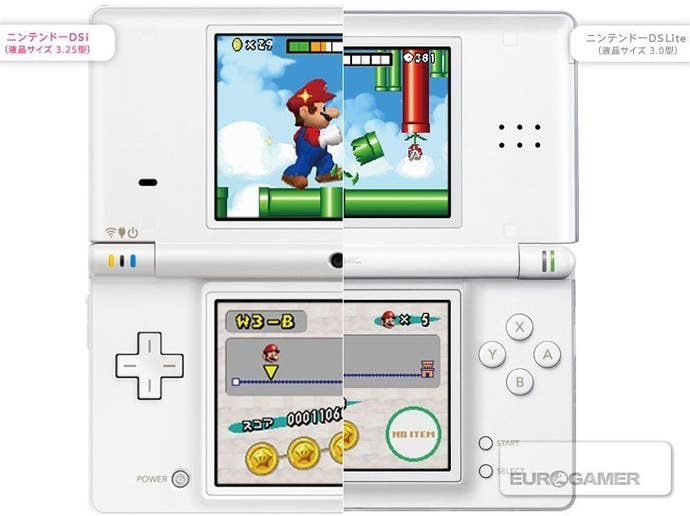Nintendo DSi
A defence.
When it comes to Nintendo, the old rules of console launches do not apply. There is no need to keep the more powerful and capable DSi in isolation, nurturing specific games and third-party exclusives, and then unleash them on the market in a competitive hammer-blow, not least because the main competition is the DS Lite itself. Nintendo is the first company in the history of games that can afford to launch a substantially new console with no software, expect it to sell and expect to make money off every unit sold, and not even bill it as a particularly new console.
Yet, for all of that, it's hard not to see where all the swearing's come from. Core gamers have been bred to expect things at cut prices, in huge quantities, and for anything older than today to be forgotten in the process. The market reality is artificial - the Xbox 360 may retail for GBP 129, but you don't get a hard disk, the games you actually want, or the extra controllers and add-ons you need, and Microsoft loses money for selling it to you at that price. Nintendo has to make a decision: map its behaviour to a competitive pricing strategy that is no longer relevant to its business plan and profits, or cry itself to sleep for a few weeks under a blanket of four-letter internet tirades every time it launches a new console. Evidently it's chosen the latter because, in the long run, it's a sensible compromise: you are an important part of Nintendo's plans, but you're a core gamer, so you're fickle, and when the DSi reaches the tipping point, you'll be there in a flash. This doesn't mean Nintendo hates you, or doesn't respect you.
There is one unknown quantity in all this, however, and that's the question of region-locking on DSi-specific software. Nintendo has said that this is down to a mixture of embedded communication functionality and parental controls across regions, and the company's addiction to consumer safety is well-documented (Friends codes, anyone?). But on the other hand, it's easy to understand why it adds insult to import-minded gamers who already feel injured enough by the pricing to go on the internet and tear their hair out.

The only way for Nintendo to answer this to everyone's satisfaction is to localise every game instantly, and release them all simultaneously, so nobody in Europe ever has to wait months for Rhythm Tengoku, or a new Ouendan game. But of course this is impossible. Never mind the role of third parties, who may not even want to release certain Japanese or US games in Europe, localisation is far from instantaneous, and Nintendo has its own way of doing things. Take Virtual Console as proof of that: although releases roughly align, the same games in different territories are treated as separate entities, with numerous different concerns like licensing contributing to delays in some cases, if not complete absence in others.
The irony is that there's no question Nintendo is better at releasing things quickly in Europe than it used to be, but it will never be enough for everyone. The greater irony is that this is because the DSi is being pitched as an upgraded DS rather than a new console, despite its numerous revisions. But the greatest problem is that even if Nintendo were to overcome localisation delays and standardise game releases across regions, region-locking still restricts people who honestly spend time in more than one country, and want to buy their DS games wherever they are. There's no answer for them except the lifting of region coding.
All of which leaves us with one question: should you buy a DSi on 3rd April? By now you probably know the answer. I think it's a splendid handheld, and you can read more about exactly what it does that appeals in our already-extensive Japanese DSi hands-on, which covers all the specifics. But the truth for core gamers is the same now as it was then: you don't need this yet, but you will one day, and Nintendo isn't quite the ogre you were thinking.
Nintendo DSi goes on sale in Europe on 3rd April for GBP 149.
